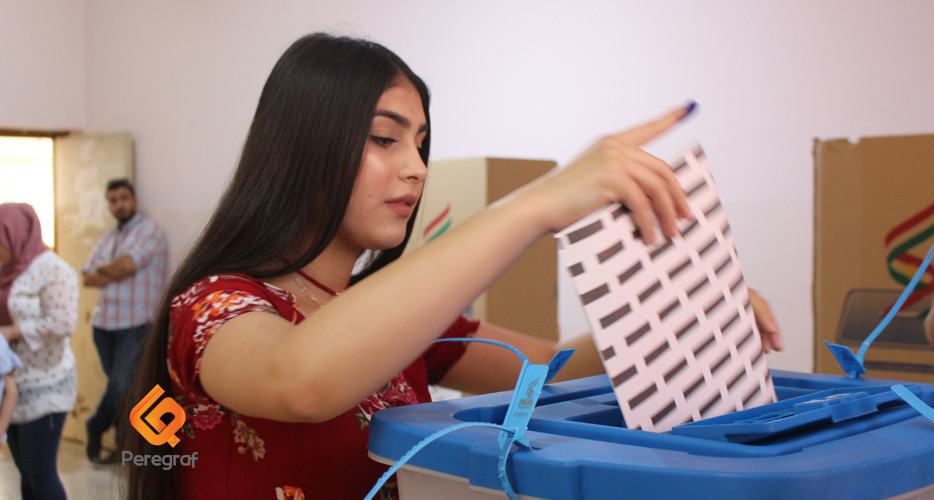
Peregraf- Ammar Aziz
The political parties in the Kurdistan Region, both those in power and in opposition, are warning that holding regional elections by the end of the year may prove impossible, despite official calls from the Kurdistan Region presidency and the parties.
On July 10, Kurdistan Region President Nechirvan Barzani sent a letter to election officials in Baghdad requesting that the elections for the Kurdistan Parliament be held either on November 18, as originally scheduled, or on December 18, when Iraq holds provincial elections.
The Independent High Electoral Commission (IHEC) has said, however, that there is insufficient time for the November date, since it needs at least six months to prepare , and that it would be technically unfeasible to hold regional and provincial polls at the same time.
As a result, the Kurdistan Region is currently in a political vacuum, without legislative oversight of the executive.
While the Kurdistan Democratic Party (KDP) and the Patriotic Union of Kurdistan (PUK) blame each other for the delay, the opposition is calling for elections as soon as possible.
"If they have the courage, let them hold elections. Whether today or tomorrow or next year, a big defeat awaits you," saidShaswar Abdulwahid, leader of the New Generation Movement, in a statement directed against the ruling parties.
Disagreements between the KDP and the PUK about reforming how the parliamentary seats reserved for minority communities are allocated was a major reason for why elections were not held as originally scheduled on October 1, 2022. The two ruling parties also engaged in lengthy talks about voter registration lists, the shape of constituencies, and the reactivation of the regional election commission mandate.
"It is unlikely that the elections will be held this year, but we hope to hold them this year," Abdulstar Majid, a member of the leadership of the Kurdistan Justice Group (KJG), told Peregraf.
"We are not satisfied with the current law. We had a bill in the Kurdistan Parliament to amend the law, but unfortunately it was not amended," he added, stressing that his party was preparing for elections even though it is uncertain when they might happen.
The Kurdistan Region’s electoral law dates back to 1992 and some parties have called for wide-ranging reform of the law, but there was no substantive progress during the last parliament.
“It is impossible to hold elections at this time. The main reason is the disagreement between the PUK and the KDP," said MueedAhmad, head of the Gorran Movement in Duhok.
"The process has been very complicated. We have fallen into a constitutional and legal vacuum, which is very difficult to resolve,” Ahmad continued. “Now that there is no parliament, if we have any complaints about the law, who will amend the law?”
After the expiration of the term of the Kurdistan Parliament last year, MPs from the PUK, Gorran, and the KDP voted to extended the term of the parliament for a year, but this was struck down as unconstitutional by Iraq’s Federal Supreme Court, rendering the Kurdistan Parliament unable to reactivate the regional electoral commission.
“The KDP tried to hold the elections on time, but other people prevented the speaker and appealed to the federal court," Khalid Doski, head of the elections department at the KDP's Duhok organizing bureau, told Peregraf.
"I am optimistic that elections will be held at the end of this year or next spring," Doski said, "The process must be organized as soon as possible.”
He argued that other parties had an alternative agenda and do not want to hold elections.
“They are afraid of the rule of the people of the Region and are drowned in their internal problems," he said.
Diyar Akrayi, spokesman for the PUK's Duhok organizing headquarters, told Peregraf that his party was in favor of elections “in principle.”
“It is a national issue. It is important that the political parties agree on the law to have a clean, fair, and transparent election.For this to happen, there must be a modern law because the law is old and it will not lead to a fair and transparent outcome,”Akrayi said.
The KRG's electoral law has been appealed to the Federal Court to comply with the Iraqi electoral law.
"We are in a legal vacuum. The political parties should start talks as soon as possible to find a solution to this issue," Akrayisaid.
Under existing law, the Kurdistan Region should hold parliamentary elections every four years, but none have been conducted on time since 1992.
"We had a special project to amend the electoral law, but there is no room for amendment” Khalil Ibrahim, spokesman for the Kurdistan Islamic Union (KIU), told Peregraf.
He said that his party has filed a complaint in federal court to change the law to split the Kurdistan Region up into four constituencies, based on the governorates.
"It is out of our hands,” Ibrahim said. “The Baghdad commission says we cannot [conduct elections], but we do not believe that and we are not convinced of these words. They canand they should work harder and hold the election, but why not do it is their own thing.”